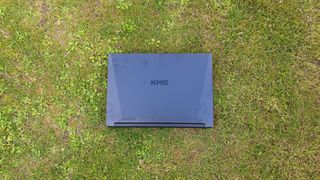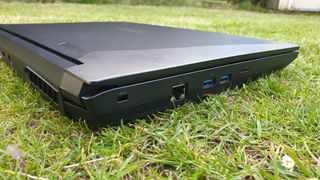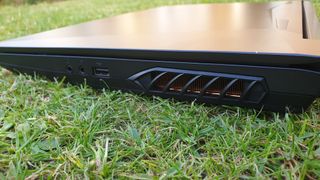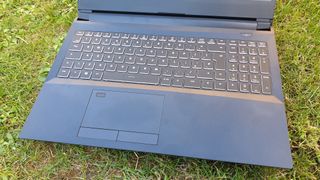TechRadar Verdict
Make no mistake, the Schenker XMG Apex 15 laptop is not for everyone. Its battery life is ridiculous and you might pull a muscle lugging it around. But for those with a serious need for speed, there’s absolutely no substitute.
Pros
- +
Fastest laptop on the market
- +
Capable of powering three 4K monitors
- +
Swappable processor
- +
Relatively affordable
- +
Runs rather cool
- +
Plenty of connectors
- +
Excellent upgradability
- +
OS cost is optional
Cons
- -
Very poor battery life/low battery capacity
- -
HD webcam
- -
No Thunderbolt 3
- -
USB 2.0 port
Why you can trust TechRadar
The Apex 15 by XMG is the most powerful mobile workstation that has landed on our desk (well not literally). The German company is one of the many boutique laptop vendors that are flourishing in AMD’s new golden age; something that hadn’t happened since the days of the K7.
Schenker used a chassis from a popular laptop ODM (original design manufacturer), Clevo, to produce the first laptop that contained a 16-core processor. What makes this feat even more remarkable is the fact that the NH57AF1 (its ODM name) is a 15-inch, sub-3Kg laptop rather than a 17-inch monster. Note that this is a gaming laptop at its heart but we reviewed it as a mobile workstation, a role where it excels.

Design
We have handled a number of Clevo-based and there's a common theme that runs through them. The design language is all about prioritising versatility and modularity above aesthetics, something that will divide opinions. The Apex 15 won’t win any beauty contests but it doesn’t aspire to.

Instead it focuses on getting the basics right; almost every component in it can be replaced (battery, CPU, memory, storage, comms) and there’s plenty of cooling and ventilation to keep its hardware cold. That explains why, despite weighing less than 2.7kg, far less than most of its predecessors, its thickness - 33mm - is still surprisingly significant.

Having a bigger chassis comes with its advantages especially for the target audience, professionals and power users. For one, there’s plenty of external connectivity options: four USB ports (one v2, two v3.2 Gen2 and one Type-C 3.2 Gen2), one Mini DisplayPort 1.4, one HDMI 2.0, two audio jacks, a Realtek-powered Gigabit Ethernet port and a microSD card reader.

Hardware
Here are the full specs of the XMG Apex 15 configuration sent to TechRadar Pro for review:
CPU: AMD Ryzen 9 3950X
Graphics: RTX2070
RAM: 32GB Samsung PC3200
Screen: 144 Hz 15.6-inch 1920 x 1080 resolution
Storage: 1TBSamsung 970 EVO Plus
Ports: 1 x USB 2.0, 2 x USB 3.2, 1 x USB-C, 1 x HDMI 2.0, 1 x Mini DisplayPort 1.4, audio jack, MicroSD card reader, Gigabit Ethernet port
Connectivity: Intel® Wi-Fi 6 AX200, Bluetooth 5.0
Weight: 2.6kg
Size: 361 x 258 x 32.5 mm (W x D x H)
Battery: 62Whr
The XMG Apex 15 uses AMD’s B450 chipset and an AM4 socket which, firmware allowing, almost guarantees compatibility with the future desktop models of AMD’s Renoir 4000-series. For now, the top-end Matisse processor, the AMD Ryzen 9 3950X, is what powers the Apex 15 but because the engineers at Clevo needed a slightly cooler CPU to (thermally) fit into a much smaller chassis (remember it’s a 15-inch laptop after all), someone decided to implement an ECO mode which limits the TDP to 65W (rather than 105W). So you get all the cores, the threads and 72MB cache but at a lower speed.
Also on the feature list are two 16GB Samsung DDR4 PC3200 memory modules, a 1TB Samsung 970 EVO Plus PCIe 3.0 x4 NVMe SSD, a HD webcam, an Intel Wi-Fi 6/Bluetooth 5.0 AX200 wireless card, a NVIDIA GeForce RTX 2070 refresh with 8GB GDDR6 memory, a 62Whr battery, a lowly 720p HD webcam and a 15.6-inch full HD IPS display. Audio is handled by Realtek and other than a pair of speakers, noise cancelling microphones and Sound Blasters’s Cinema 6 technology, there’s not a lot to write about.

Performance and in use
One thing you immediately notice when using the Apex 15 is how loud it can be even when idling; it exceeded 60dB when under load during our benchmarks. To be honest though, we had it on the performance setting which dials things up. XMG’s “control center 3.0” dashboard has three other settings that are more battery friendly and less likely to get fans roaring.
Here’s how the XMG Apex 15 performed in our suite of benchmark tests:
Passmark: 6697
Passmark CPU: 31400
CPU-Z: 513.6 (single-thread); 9930 (multi-thread)
Geekbench: 1270 (single-core); 12428 (multi-core); 80043 (compute)
Cinebench CPU: 6398
CrystalDiskMark: 3571MBps (read); 3329MBps (write)
Novabench: 4727
Atto: 2970MBps (read, 256mb); 3270MBps (write, 256mb)
AJA: 3206MBps (read); 3015MBps (write)
Windows Experience Index: 9.1
The same application will allow you to change the colour of your keyboard keys, set up the brightness levels and the keyboard sleep timer. Sadly, there’s no way to customize to interact with system software (similar to status lights on a smartphone).
Test numbers are the best we managed ever, on almost all benchmarks, bar the battery life where it only achieved 58 minutes (in performance mode, without any power saving features on). This is not a surprise given the nature of the beast; the 3950X is a desktop CPU after all.
A quick word on the input peripherals and the display; the laptop lid (which XMG claims is made of metal) has some flex but the base is built like a tank and is, according to the marketing material “torsion-resistant”. The matte display has a high 90% sRGB colour space coverage, is bright with good contrast and a refresh rate of 144Hz, which translates into a far smoother Windows experience.
The fans and heatsinks did a great job at keeping the device cool; the bottom of the device and the rear exhausts never felt too warm even under load, which makes the extra fan noise seem like an acceptable compromise.

The keyboard is a signature Clevo one with a flat surface and white borders, bold characters, backlit and quite noisy with a good key travel and feedback. There’s a dedicated keypad and the touchpad is flush with the palm rest, has two dedicated mouse buttons and a fingerprint scanner.
The competition
Well, err, other than other Clevo vendors that offer the same chassis, there’s no real competition for now from Intel. As a reminder, the XMG Apex 15 costs under €2,700 ($3,054) including tax and shipping (in the EU) with the current configuration with the processor accounting for nearly a third of the price.
Go overboard with 8TB of storage (dual 2TB Seagate Firecuda 510 with a 4TB 860 QVO SSD), 64GB of RAM and a three year premium warranty and you’d still only manage to add another €1,500 ($1,697) and that’s not a lot. We dare even say that it is a (relative) bargain, one made even better by the fact that you can order the laptop without Windows, saving you a few more Euros.
Final verdict
The XMG Apex 15 is built like a vintage supercar: very (very) noisy and not very economical petrol-wise but OMG, pedal to the floor, it can reach speeds that, only a decade ago would have landed it somewhere on the TOP500 list of supercomputers. And while we can complain about the battery life, one thing that did surprise us is the relatively affordable price especially when compared to comparable desktop solutions.
Improvements? We’d love to have bigger, hot swappable batteries on this desktop replacement monster. It is a bit of a travesty that the far lighter (and thinner) Clevo-based PC specialist Lafite Pro laptop we tested recently had a much bigger battery.
We’re keen on seeing an 8TB SSD drive offered as an option (like the new Samsung 870 QVO or the Sabrent Rocket Q 8TB) which would pave the way for a 24TB workstation. After all, why not? Idem for a potential upgrade route to the NVIDIA GeForce RTX 2080 SUPER GPU, the fastest one around. Oh and do kill that lonely USB 2.0 port.
- Also check out our complete list of the best mobile workstations

Désiré has been musing and writing about technology during a career spanning four decades. He dabbled in website builders and web hosting when DHTML and frames were in vogue and started narrating about the impact of technology on society just before the start of the Y2K hysteria at the turn of the last millennium.
Most Popular



